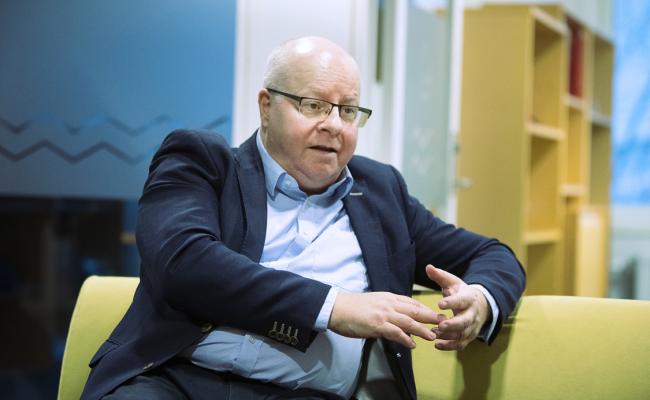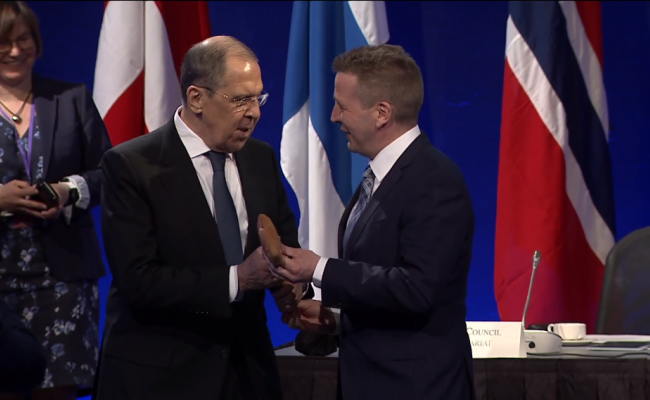Arctic Council resumes work: Might push Russia to withdraw from Arctic Council

“There is always the concern that Russia utilizes its prerogative as an Arctic State to object to the publication of the final product under the Arctic Council brand”, says Jeremy Greenwood from The Brookings Institution, about The Arctic Councils resumption of work without Russia. (Photo: The Brookings Institution)
The Arctic 7 of the Arctic Council are within their rights to continue without Russia. "But it may leave Russia with little choice but to formally withdraw from the Arctic Council", says Jeremy Greenwood from The Brookings Institution.
Last week, seven of the Arctic Council's eight member states issued a joint statement on the limited resumption of Arctic Council cooperation.
“We intend to implement a limited resumption of our work in the Arctic Council, in projects that do not involve the participation of the Russian Federation”, the Arctic Council – without Russia – announced.
However, Norway´s Arctic Ambassador and Senior Arctic Official (SAO) to the Council denies any speculation that Norway might be taking over the chairmanship earlier than planned in 2023, in an interview with HNN.
"Valid argument"
So how will the now Arctic 7 resume their work without formal leadership as Russia currently holds the chairmanship?
We asked Jeremy Greenwood, Federal Executive Fellow at The Brookings Institution, who says that the Arctic 7 is making a valid decision;
A Russian objection would not matter.
“I think what we are seeing is a recognition from the SAOs that they believe they have some flexibility to operate on the margins of the Rules of Procedure. While it is very clear that the Chairman sets the agenda and projects, I think there is a very valid argument to be made that the previous agreement of the SAOs to conduct certain projects remains in place”, says Greenwood.
Russia could object
He argues that regardless of Norway not assuming the Chairmanship early, the other 7 do have "clearance" to continue the work that was previously agreed upon by all 8 states.
“Of course, while the work may continue on pre-existing projects with no "legal" or international norms issues, there is always the concern that Russia utilizes its prerogative as an Arctic State to object to the publication of the final product under the Arctic Council brand, says Greenwood.
And if they do that, Greenwood says, the other 7 will need to think about how to proceed.
Biggest part of Arctic
“As an alternative, they could publish reports, findings, recommendations under the auspices of the individual member states or the Permanent Participants. I do not see that as an issue, and a Russian objection would not matter.”
Many scientific programs, research and efforts without Russian participation will be of lower quality and impact.
“What does this mean for the future of the council, that the work continues without Russia? It is after all, the biggest part of the Arctic.”
“There is no doubt that many scientific programs, research and efforts without Russian participation will be of lower quality and impact. Of course, much of the work of the Council is about recommendations and analysis of pre-existing research and climate data that the 7 states have access to without Russian participation”, Greenwood states.
And those reports and products would still be of great value to the Arctic policy community, he adds.
Warning
“It would be a shame though, if Russia fails to take any of those items seriously because of its exclusion - thereby severely limiting the impact of changes made without Russian "buy-in" or engagement - representing the largest part of the Arctic”.
Following the Councils statement, the Russian ambassador to USA was quick to warn about legal consequences should the Arctic 7 go on without Russia.
I am not sure there are many "legal" consequences available to Russia.
“Which consequences are realistic in this scenario?”
“This is interesting. Other than sending a demarche and registering their official displeasure at these efforts, I am not sure there are many "legal" consequences available to Russia, Greenwood comments.
Can withdraw
“They can, of course, withdraw from the Arctic Council at any time, which could be bad for Arctic cooperation and efforts at large, but that is not a legal consequence per se”, Greenwood says.
He thinks it is important that the Arctic 7 are clear in their intentions moving forward;
“Which I am not sure they are right now. If they intend to continue with previously approved projects agreed upon in the past by all 8 states, and not publish them under the Arctic Council logo if Russia objected, then I think they are on solid ground”, says Greenwood.
But;
“If, however, it is the intention of the Arctic 7 to defacto continue the Arctic Council without Russia and not take any formal action to create a new organization or consult Russia on the final products - that seems like a very confusing course of action that may leave Russia with little choice but to formally withdraw from the Arctic Council”, concludes Jeremy Greenwood.





